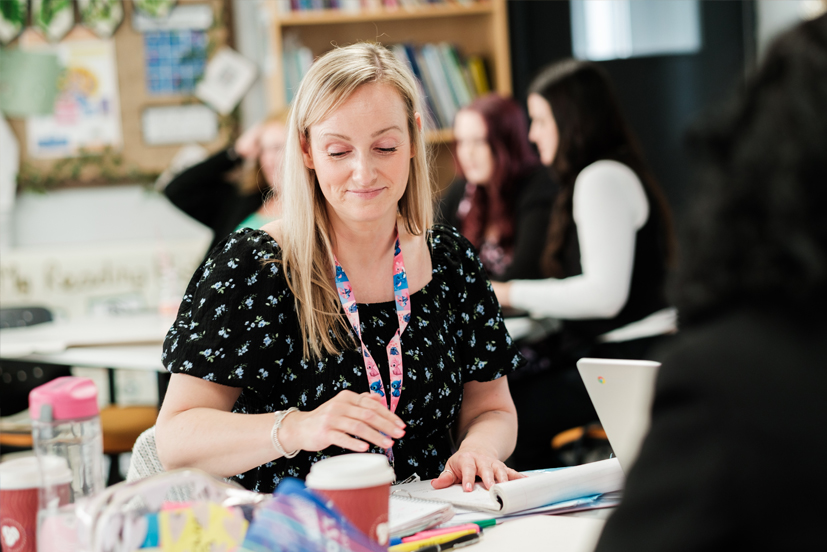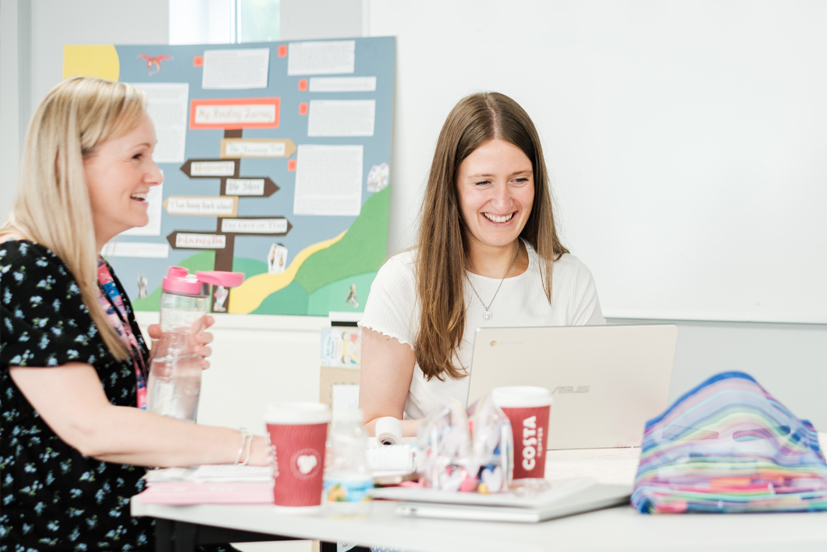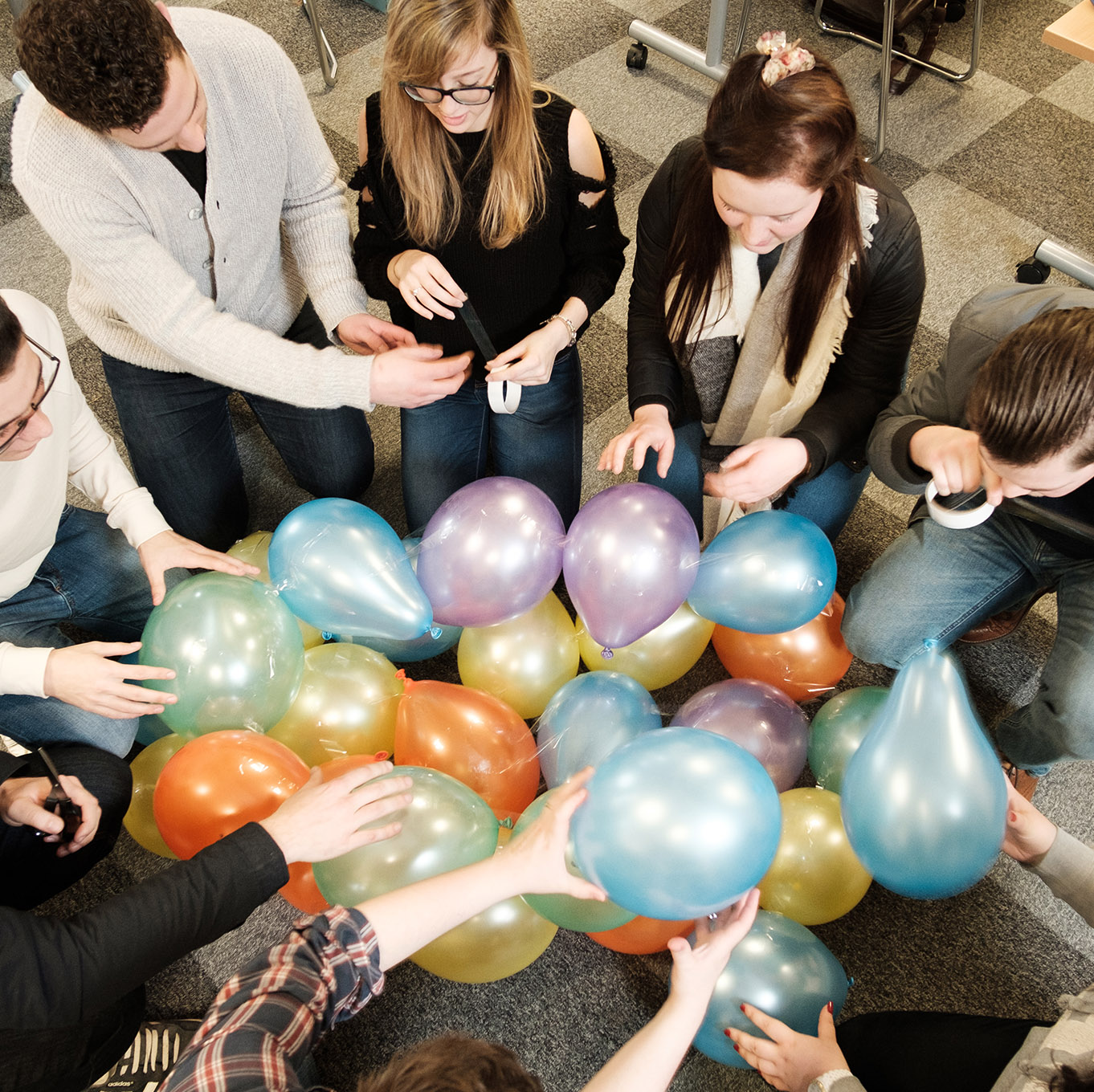BA (Hons) Education Studies

Course details
UCAS Code
BAES
Year of entry
2024, 2025
Duration
3YRS (FT) / 4YRS (PT)
Institution Code
G53
Location
Blended Learning, Wrexham
Course Highlights
Practical experience
Work placement opportunities at each level of study in a range of settings
Top 10
In the UK for Student Satisfaction (Complete University Guide, 2025)*
Employability focused
Graduate with the knowledge and skills key for future employment or study
Why choose this course?
Unlock your potential and make a difference in the fields of formal and informal education with the BA (Hons) Education Studies programme. This dynamic and forward-thinking programme is your gateway to a rewarding career dedicated to shaping the lives of children aged three to eleven years.
The course:
- Includes up to 315 hours of real-world placements, building valuable connections and enhancing your educational practice.
- Equips you with a diverse set of transferable skills highly sought after by employers, including communication, critical thinking, problem-solving, and digital fluency.
- Provides a respected route into mainstream teaching via PGCE (Primary Education) or PcET (Adult and Further Education) teaching qualifications.
- Offers flexible full-time and part-time study routes. Part-time students can choose from on-campus or online study modes to help balance study, work and family commitments.
- Offers valuable opportunities to network with professionals and potential employers, increasing your chances of securing employment upon graduation.
*Wrexham University is rated 1st in Wales and joint 2nd in the UK overall for Student Satisfaction
Key course features
- Explore a range of contemporary topics relevant to working with children from 3 to 11 years. Drawing on the domains of psychology, sociology, curriculum studies, cultural studies, human rights and global education, acquire skills to help you gain employment in the Education sector.
- Gain practical experience through diverse placements in schools, nurseries, local authorities, third sector organisations, and the private sector. Contextualise your learning and build valuable employment relationships.
- Conduct authentic work-based research on a topic of your choice over two years of study. Make a unique contribution to the field of education through authentic work-based research on a topic of your choice.
- At level 6 the aim is to successfully complete your degree and apply your knowledge to practice. You will explore the role of leadership in practice and plan your own professional development whilst out on a three-week placement. You will also further develop your independent study skills by completing your final year dissertation.
- Benefit from additional training and qualifications such as Outdoor Learning, Makaton and Paediatric First Aid to enhance your employment potential.
What you will study
Year 1 (Level 4)
Level 4 offers you the opportunity to build strong foundations in the field of education studies. You will learn how to be a degree level student and prepare for and undertake your first 6 week placement.
MODULES
Learning and Teaching in Primary Education (Core) –
This module will introduce you to working within the primary education sector. You will explore key educational theories, the primary curriculum, the holistic needs of the child and being a reflective practitioner.
Contemporary Debates in Childhood and Education (Core) – In this module you will explore the different and varied influences that society and the environment has on childhood and education. Topics could include mental health, technology, sustainability, race, gender and poverty.
Psychology of Childhood (Core) -In this module you will develop a psychological understanding of child development and consider how adults can influence the way children think, feel, and interact with the world around them.
Professional Practice for Childhood and Education (Core) – This module will prepare you for placement by exploring the expectations, conduct and attitudes required in the workplace. You will cover health and safety, safeguarding and the ethics of working with children. You will also start to consider your own future career goals. During this module you will experience a 6 week placement in practice.
Skills for Study and Employability (Core) – This module is all about building study and employability skills. You will be guided to explore your current skills and to develop these further to enhance your learning journey and future career outcomes. This module will also help you to develop digital technology skills to use in your studies and in employment.
Year 2 (Level 5)
Level 5 builds on the skills and knowledge you developed at level 4 by further specialising in the field of education. At level 5 you are introduced to authentic work-based research and you will engage with your extended 8 week placement.
MODULES
Additional Learning Needs and Neurodiversity (Core) – In this module you will explore a range of conditions, including (but not limited to), autism, ADHD, dyslexia and dyspraxia. You will explore the legal frameworks, policy and practice important to children with ALN and discover the challenges and strategies to support their inclusion in education and society.
Social Action – Supporting Children and Families in Society (Core) – In this module you will explore informal education and the role that society can play in supporting children and families within their communities. You will discover what it means to be a volunteer and the benefits you may gain from this. You will be introduced to a range of voluntary organisations including the Children’s University and HomeStart (amongst others) and encouraged to explore their purpose and the activities/services they provide.
Children’s Rights and the Law (Core) – This module will support you to understand the legal framework underpinning children’s rights and the complexities of supporting children’s rights in practice. You will consider how children’s rights are expressed within law and policy, the critical debates around the UNCRC and the variety of ways children’s rights can be supported by those responsible for the care and education of children in society.
Practice Informed Research (Core) – In this module you will explore the meaning and purpose of practice informed research before choosing an authentic topic to research on placement. This is the start of your research journey and by the end of your 8 week placement you will have obtained ethical approval and collected your research data using primary research tools ready to write your dissertation at level 6.
Year 3 (Level 6)
At level 6 the aim is to successfully complete your degree and move into employment. You will explore the role of leadership in practice and plan for your own professional development whilst out on a three week placement. You will also further develop your independent study skills by completing your final year dissertation.
MODULES
Comparative Education: International Perspectives (Core) – In this module you will consider international education and the economic, political, social and historical forces which shape education across the Global North and Global South.
Exploring Expressive Arts (Core) – This module will help you to understand the role of the expressive arts in education and childhood. You will explore a range of expressive arts analysing their connection to cultural and historic contexts and their role in promoting social justice and equality for all children. There will be opportunities for hands on practical learning.
Leadership and Professional Development (Core) –In this module you will explore the role of leadership in practice and shadow a practitioner with leadership responsibility in your level 6 placement. You will also start to consider your own professional development as you prepare to enter employment or further study.
Dissertation (Core) – This module supports you to engage in an extended piece of academic writing. Based on the primary research data you gathered at level 5 you will write a research dissertation which foregrounds your own unique voice as a researcher.
The information listed in this section is an overview of the academic content of the programme that will take the form of either core or option modules. Modules are designated as core or option in accordance with professional body requirements and internal academic framework review, so may be subject to change.
Entry requirements & applying
The academic requirements for the course are:
- 80-112 UCAS tariff points at GCE A Level or equivalent.
- GCSE grade C/4 or above in English/Welsh (First Language).
Students without the above entry requirements, who can demonstrate engagement with the sector, are welcome to apply and will be considered on an individual basis.
Students wishing to join the programme on a part-time basis must also meet the following entry criteria:
- A minimum of 2 years employment experience in the Children’s workforce prior to starting the course.
- Current employment in the Children’s workforce.
Before applicants are offered an unconditional place on this degree, they will be required to complete a Disclosure and Barring Service (DBS) clearance (previously known as CRB) they are required to have an Enhanced Child DBS (with child barred check).
Teaching & Assessment
As a full-time student you will attend campus for up to 3 days per week which will include a mixture of classroom and online based learning. Classroom sessions provide you with an opportunity to learn alongside your fellow students and are based in activity and discussion. Online materials are used to prepare you for the classroom sessions and to provide follow-on work/research for you to complete in your own time.
As a part-time student you can use our flexible study mode to choose the right pathway through your studies for you. You may choose to study one day per week in the classroom alongside our full-time students, you may choose to study online using our Virtual Learning Environment (Moodle), or you can choose a combination of both. If you choose to study 100% online with us you will receive regular on-campus or online meetings with your tutors outside of work hours.
A range of assessment methods will be used throughout your studies and could include: case studies; handouts, posters, observations; portfolios; presentations, essays, reports and a dissertation at level 6. Our assignments are chosen to help you develop the skills and writing techniques you will need for future employment or study.
Placement in practice forms an important part of your degree studies. During your studies you will undertake 3 placements:
Level 4 - Professional Practice for Childhood and Education (40 credits). You will attend placement for 2 days per week for 6 weeks (84 hrs). At level 4 the purpose of the placement is for you to explore and experience professional competencies in practice.
Level 5 - Practice Informed Research (60 credits). You will attend placement 3 days a week for 8 weeks (168 hrs). At level 5 the purpose of the placement is for you to engage with authentic research ideas and to collect primary research data.
Level 6 - Leadership and Professional Development (40 credits). You will attend placement 3 days a week for 3 weeks (63 hrs). At level 6 the purpose of the placement is for you to observe leadership skills and to consider your own professional development in relation to future employment.
Our placements include (but are not limited to) schools; nursery settings; local authority settings, for example the Child Prevention and Support Service and Flying Start; third sector organisations, for example Home Start, Action for Children and Save the Family; and the private sector, for example Residential Homeless Support for Families and Residential Family Assessment Centres.
Part-time students will use their normal place of work to complete their placement hours.
Career prospects
Our Careers & Employability service is there to help you make decisions and plan the next steps towards a bright future. From finding work or further study to working out your interests, skills and aspirations, they can provide you with the expert information, advice and guidance you need.
Fees & funding
You do not have to pay your tuition fees upfront.
The fees you pay and the support available will depend on a number of different factors. Full information can be found on our fees & finance pages. You will also find information about what your fees include in the fee FAQs.
All fees are subject to any changes in government policy, view our undergraduate fees.
Programme specification
Accommodation
If you’re looking for a place to stay while you study then take a look at our accommodation pages to get more information on your options, including our on-campus halls of residence Wrexham Village.


